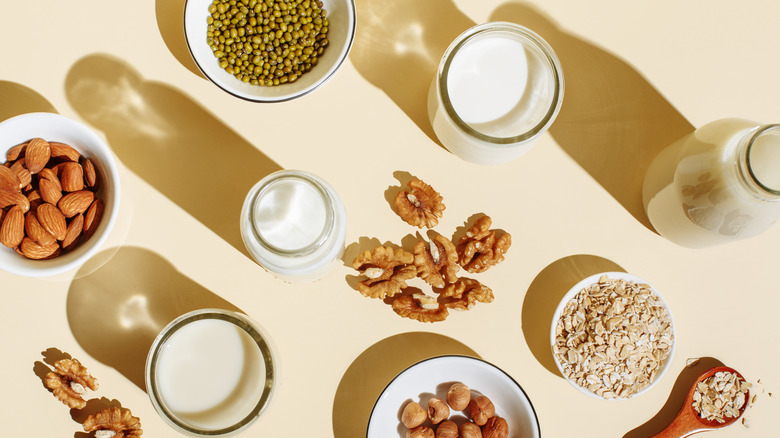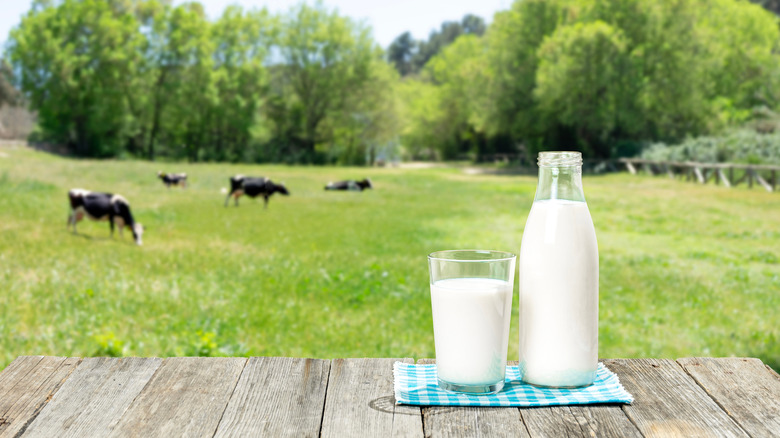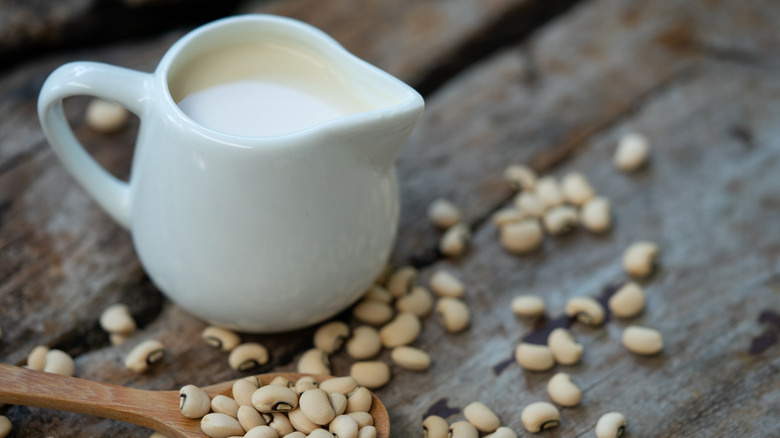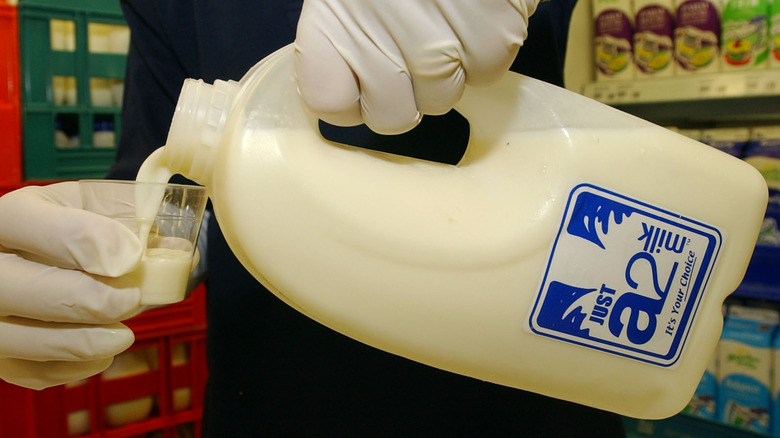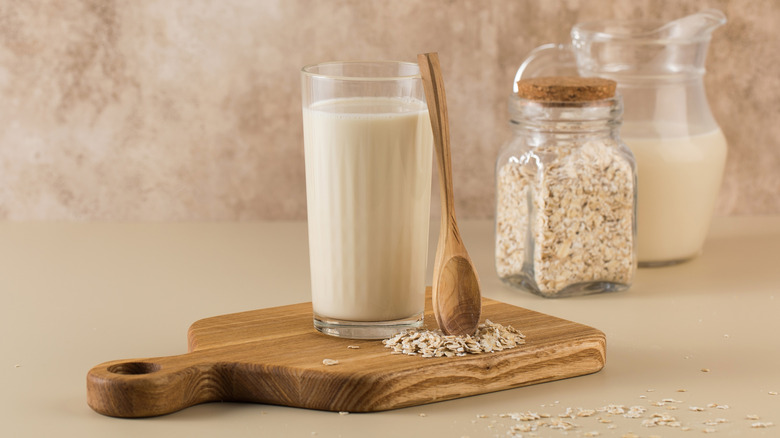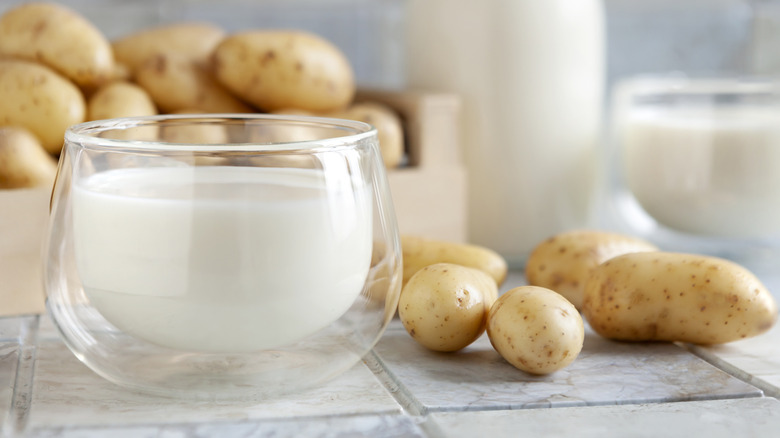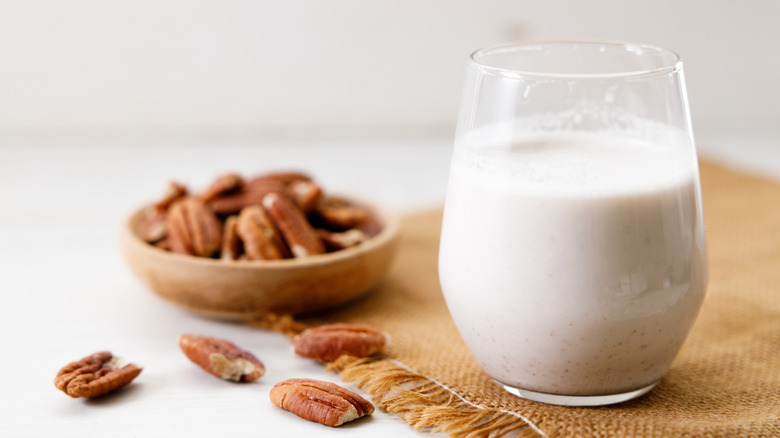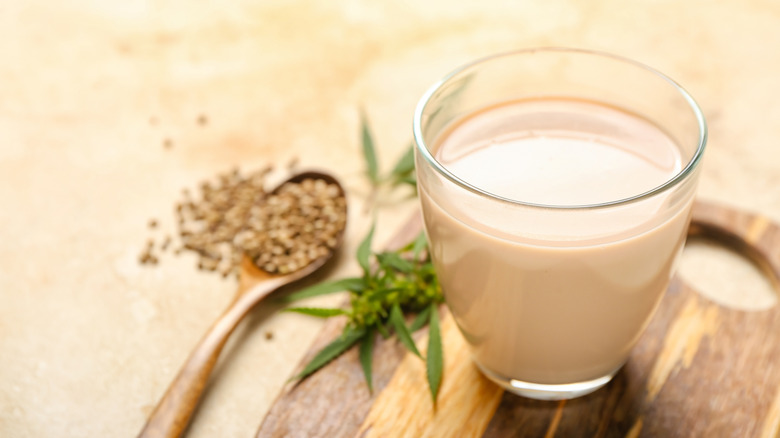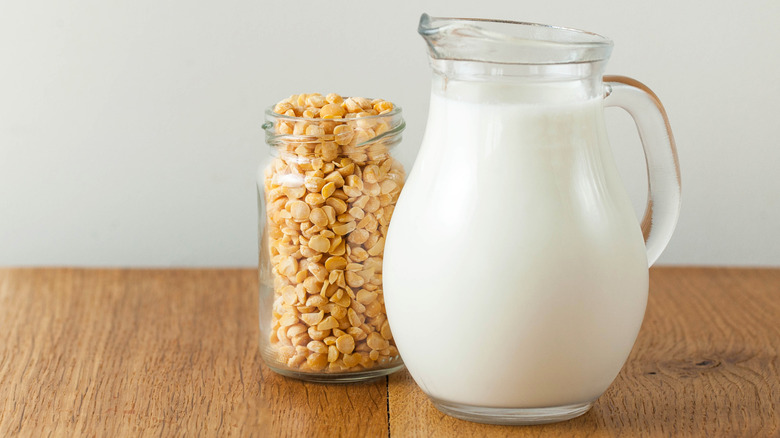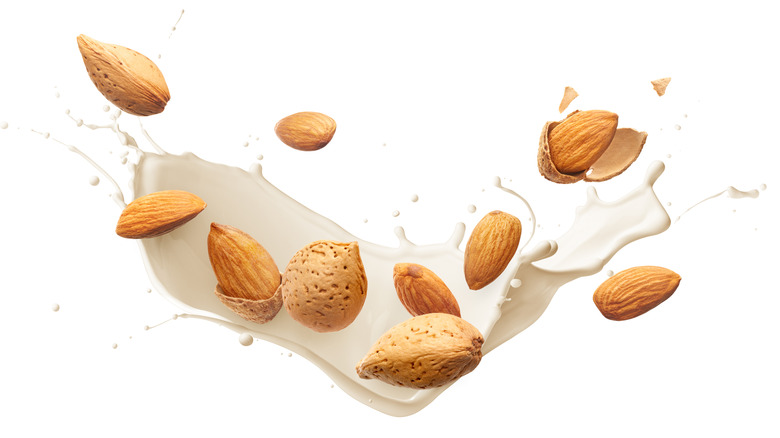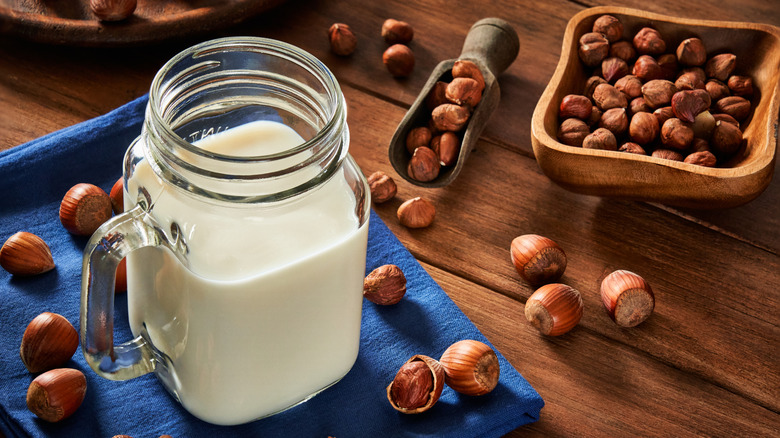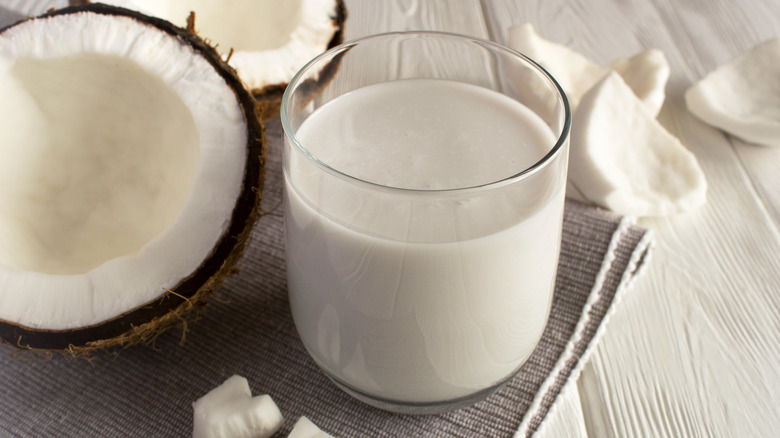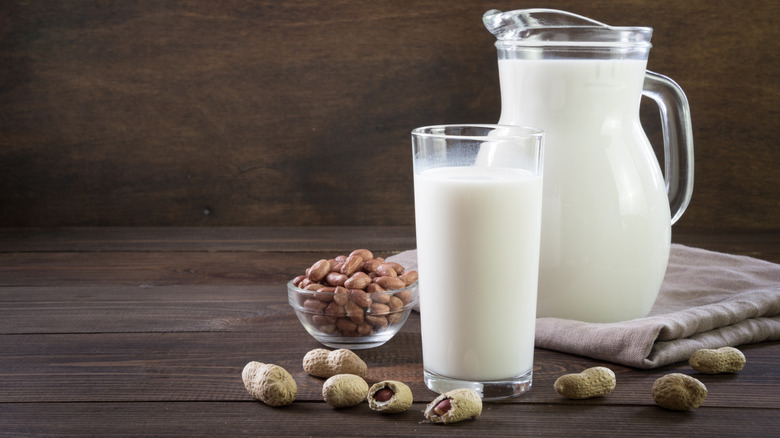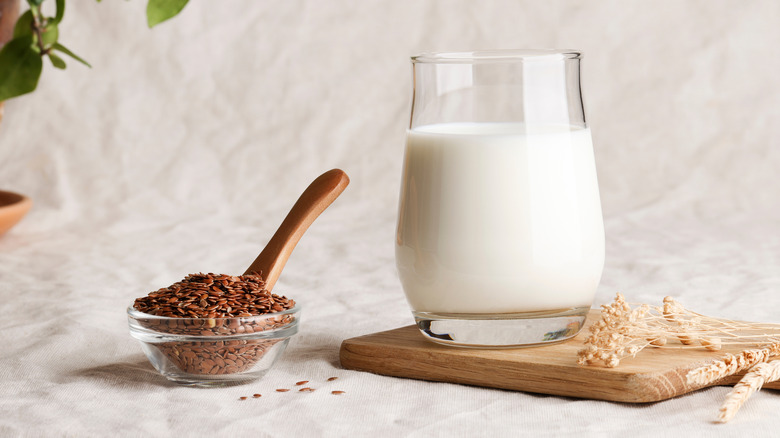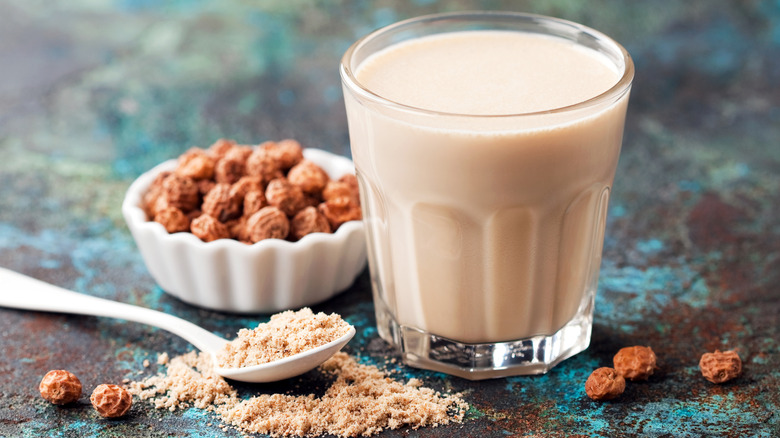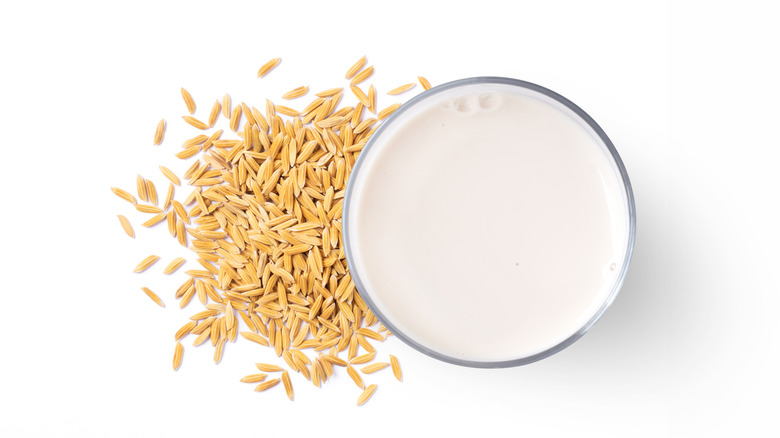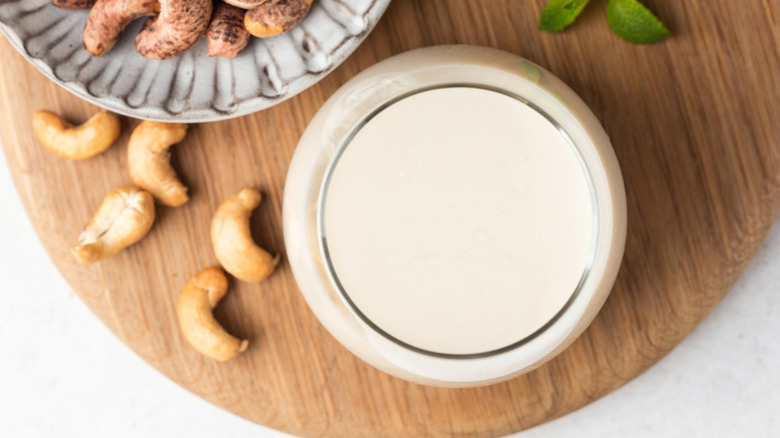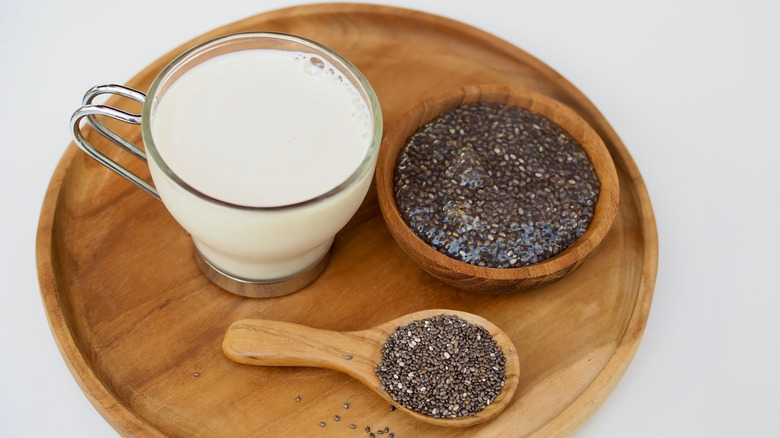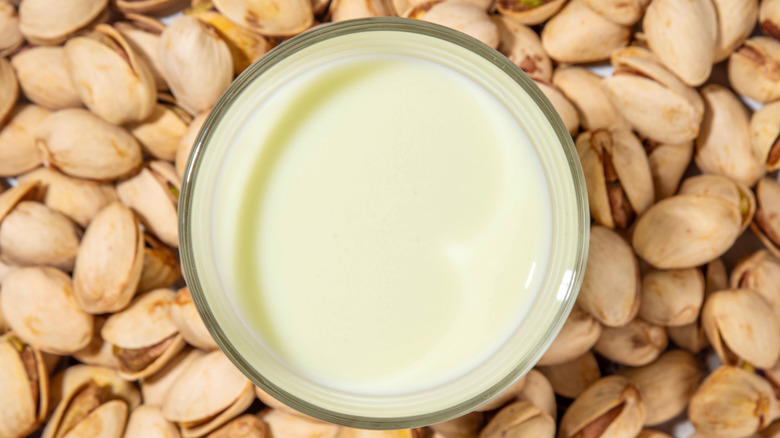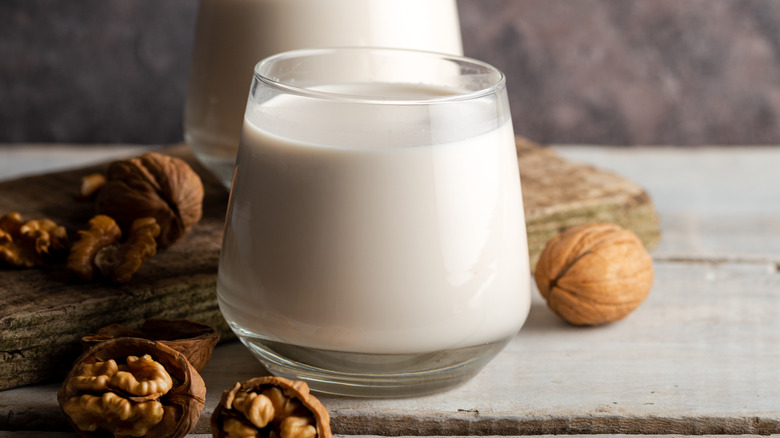25 Alternatives To Cow's Milk (And How To Use Them)
We may receive a commission on purchases made from links.
Cow's milk has been part of the human diet for around 10,000 years — though back then, people were milking aurochs, the ancestors to the modern cow. Apart from preventing many populations from starving to death, milk was the inspiration for smallpox vaccinations and pasteurization.
Despite those milestones, somewhere between one in 20 and one in 50 people in the United States are allergic to cow's milk. In response, a vast market of other animal and plant-based milks has emerged, but how do they compare to their bovine counterpart? Here's our look at 25 alternatives to cow's milk, including their health benefits, how much they cost, and what you can do with them.
Lactose-free milk
Research has shown that humans developed the ability to digest milk around 8,000 years ago, but it took until 1985 for scientists to develop lactase, the enzyme that allows some lactose-intolerant people to consume dairy products, including milk.
Lactose-free milks can be used in the same way as cow's milk, including making your own condensed milk to elevate your toast. They also contain all the same nutrients, such as calcium and vitamin B12. Prices are comparable to cow's milk, too. For example, Lactaid's 2% reduced-fat milk costs around $6.49 for 96 fluid ounces or ¾ of a gallon.
Soy milk
Although it enjoyed a boom in the 1990s and early 2000s in the United States, soy milk has been a thing for thousands of years, particularly in Asia. It's a great straight swap for cow's milk, as its mild flavor makes it perfect for all kinds of recipes. You can also make it at home with special machines, such as this one from Idavee.
Soy milk has lots of health benefits, too. It's packed with protein and omega-3 fatty acids, and is also a good source of potassium for a healthy heart. It compares well with cow's milk for price, with a pack of six quarts of Silk organic soy milk costing around $15. It is worth reading the labels, as some products can be loaded with sugar.
A2 milk
In New Zealand in 2003, the A2 Milk Company launched a new cow's milk made from animals that only generated the A2 β-casein protein, as opposed to the traditional mix of A1 and A2. Now a global industry, A2 milk enables many people who struggle to digest traditional cow's milk to enjoy it with no issues.
Apart from the missing A1 protein, A2 milk is exactly the same as cow's milk, and has the same nutrients including calcium and protein, as well as versatility when it comes to cooking. That said, more research is needed to establish if A2 milk is easier to digest. As for the price, an 8.8-ounce pack of Mountain Essentials A2 whole milk powder is a whopping $28.99 as of this writing, working out at $3.29 per ounce.
Oat milk
Oat milk is suitable for people who are sensitive or allergic to lactose, soy, and nuts. Many brands also offer gluten-free versions, like Califia Farms' Barista Blend oat milk. Oat milk has less protein than cow's milk but is a good source of carbohydrates and often has added vitamins and minerals. It's also great to bake with and as a base for smoothies.
It is worth reading the packaging labels to determine not only if the oats are gluten-free, but if they were grown without cancer-causing pesticides. Or you can make oat milk at home by blending oats with water and straining them through a cloth, but it won't have the same vitamins and minerals as fortified, store-bought versions.
Potato milk
We have Swedish company Veg of Lundto thank for this alternative to cow's milk, which is packed with nutritional goodies like fiber and carbs, and is also nut- and gluten-free. You can cook with it, though be aware potato milk has a distinctive taste and can curdle in some dishes.
It's easy to make at home, too. Simply cook your potatoes until soft, blitz them with a little water until you get a smooth consistency, and strain the lot through a muslin cloth. Many people sweeten their potato milk with honey, or you can use the hints and tips in Laurie J Robinson's book, "Potato Milk! The Perfect Dairy Alternative."
Macadamia milk
The appetite for plant-based milks has been great for nut-based products, including macadamia milk. Beloved of baristas from Starbucks to artisan outlets, it is relatively low in calories and has more of the "good" fats than other types. It's also one of the most sustainable milks, thanks to macadamia trees' ability to cope with climate change.
Made by softening the nuts' kernels in water before being blitzed and strained, macadamia milk is great for baking, infusing cookies and cakes with its nutty creaminess. Once a niche product, it's now firmly mainstream, although a little pricer, with brands like Milkadamia selling a 34 fluid ounce carton for around $5.
Goat's milk
People have been enjoying goat's cheese and milk for thousands of years, so it's no NKOTB as a cow's milk alternative. Goat's milk has lots of calcium and protein, with less cholesterol than its bovine counterpart, and it's thicker and creamier. Although the somewhat "goaty" taste isn't for everyone, it's a great substitute in baked goods, including bread.
Goat's milk also contains oligosaccharides, a natural prebiotic that supports gut health. However, if you're lactose intolerant or sensitive to cow's milk, this could cause more digestive issues. Prices vary, but a half-gallon bottle from Oak Knoll Dairy will set you back $10.99, around $0.17 per fluid ounce.
Pecan milk
Pecan nuts aren't just tasty, toasted additions to brownies or cookies; it turns out these versatile nuts also make a delicious alternative to cow's milk. Pecan milk is packed with antioxidants, fiber, vitamins, and minerals, and is low in saturated fat. Plus, it's a sustainable option for United States' buyers, where pecan trees are a native species.
Like many nut milks, pecan milk tastes sweet, creamy and, well, nutty. It's ideal for pouring over cereal or adding to hot or cold drinks, and can be used in a range of sweet and savory recipes. It's easy to make at home: Just blend pecan nuts with water and strain, or you can buy a 32-fluid-ounce carton of PKN pecan milk for $9.99.
Hemp milk
Made with a blend of seeds from the Cannabis sativa plant (the same one that produces marijuana) and water, hemp milk is a healthy alternative to cow's milk. As well as containing all the amino acids we need, it's soy-, nut-, and gluten-free and a great source of omega-3 and omega-6 fatty acids.
Hemp milk is creamy, with a nutty taste. You can bake with hemp milk and use it in soups and sauces, though boiling it can alter the taste and texture. It can be a bit more expensive than cow's milk: A 32-fluid-ounce carton of Pacific Foods' unsweetened hemp milk costs over $9 as of this writing.
Pea milk
One of the biggest surprises about pea milk is the color: Unlike traditional canned peas, it's not green. Made from yellow peas that have been ground into a flour, the purified protein is extracted and mixed with water to create a milk very similar to that of cows. Pea milk is almost fat-free, though some brands add oils to enhance the creaminess, alongside vitamins and minerals.
You can make it at home, either using pea powder like this unsweetened variety from Folona, or by the traditional blending and squeezing method. It's worth noting pea milk can have more salt than other types, but can still be a great direct replacement for cow's milk in a range of sweet and savory dishes.
Sheep's milk
Like cow and goat milks, humans have been drinking sheep's milk for thousands of years, but the latter is gaining in popularity — and with good reason. It's easily digestible, an excellent alternative for anyone sensitive to cow's milk, has more vitamin E and B than other types, and has a smaller environmental impact.
Sheep's milk also has lots of protein, and it's commonly used to make either ice cream or gelato, cheese, or yogurt. You can use it in the same way as cow's milk in a wide range of recipes. If you're a latte lover, switching to the slightly sweeter sheep's milk could help you cut down your sugar intake. Prices vary, but you can pay around $13 a quart.
Almond milk
Loaded with calcium, fiber, and vitamin E,and dairy- and lactose-free, you don't have to be sensitive to cow's milk or vegan to enjoy almond milk. It's easy to make at home, but it is also widely available and is one of the cheapest cow's milk alternatives. A 64-fluid-ounce carton of Almond Breeze's Blue Diamond almond milk costs just $2.99.
It's also versatile in cooking, from rustling up a rice pudding or using up stored spinach by drenching it in a creamy sauce. One major downside of almond milk is its environmental profile: More than 6 litres of water are needed for a single litre of almond milk.
Hazelnut milk
With its deeply nutty flavor profile, plus zero cholesterol, gluten, or saturated fat, hazelnut milk is one of the tastiest and healthiest alternatives to cow's milk. Unfortunately, all that goodness can come at a price. Hazelicious's lightly sweetened hazelnut milk offers a six-pack of 32-fluid-ounce cartons for $35.99.
It's worth the investment from environmental and culinary points of view. Hazelnut trees use a lot less water compared to almonds, and the milk can be used in a variety of ways, from baked goods and soups to shakes.
Camel's milk
In 2012, the sale of camel's milk was legalized in the United States and has been steadily finding an audience ever since. It is low in saturated fat and lactose, high in vitamins and calcium, and contains lots of protein. Camel's milk has also helped cut blood sugar levels — good news for the 38.4 million people in the U.S. with diagnosed or undiagnosed diabetes.
There are a few stings in the tail. First, camel's milk is expensive: Camelicious' Long Life product costs $12.99 for a 7-ounce bottle — that's $1.86 per fluid ounce. There are also ethical concerns about the animals' welfare, and not all products are pasteurized, carrying the risk of bacterial infection.
Buffalo milk
As the world's second-most popular milk, buffalo milk holds its own against cow's milk, with more vitamins and minerals. It also has more fat and lactose, so the debate about whether it's better for people sensitive to cow's milk continues.
Although it's very popular in Italy, China, and India, buffalo milk is harder to get a hold of in the United States, as it's more of an emerging industry. If you do manage to get your hands on a quart or two of thick, sweet buffalo milk, it makes for delicious cheeses, yogurts, and desserts.
Coconut milk
Of all the plant-based alternatives to cow's milk, coconut milk has to be one of the healthiest. This rich, creamy milk is high in the good kind of fat our livers use for energy, and, despite its name, comes from a fruit, so it's fine for people with nut allergies.
Sticking to unsweetened types like this from Pacific Foods, which costs $9.73 for 32 fluid ounces, also helps keep the calorie count down, especially in cooking. In fact, coconut milk has become so popular among bakers that the prestigious Auguste Escoffier School of Culinary Arts is a fan.
Peanut milk
You can enjoy an ice-cold glass of peanut milk with even the funkiest PB&Js. While the white stuff is a bit harder to find than the spread – Elmhurst stopped producing its peanut milk after two years – it's worth hunting around as it contains goodies including fiber, magnesium, phosphorus, and potassium.
Although thinner than cow's milk, it's also lactose-free; perfect for anyone who is sensitive to cow's milk. As well as being better for the environment than its cow counterpart, you can use peanut milk in all kinds of recipes, including smoothies, puddings, and cookies.
Flax milk
Ground into a powder and mixed with water, flax seeds create a thin but nutrient-rich milk that is dairy- and gluten-free, as well as great for vegans and anyone following a keto diet. The seeds are a well-known superfood, and as well as being good for heart health, they can also help ease menopausal symptoms.
Flax milk brings all that great nutrition to every recipe it's used in, from soups to muffins, though watch out for added preservatives, thickeners, and proteins. Flax milk compares well with other alternatives for price: A 64-fluid-ounce carton from Good Karma will set you back around $5.99.
Tiger nut milk
If you'd never heard of tiger nuts, here's the skinny: They're not actually nuts, they're tubers like potatoes. They have lots of dietary fiber, contain enzymes that help digestion, and are great for the immune system. Soaking tiger nuts in water for a few hours, then blending and straining them, makes a mild-flavored milk that's ideal for sweet or savory smoothies, hot drinks, and baking.
Tiger milk is sometimes mixed with rice milk, though the packaging should make that clear, like this option from Rude Health. As a relative newcomer to the nut milk range, expect to pay more for it, too. The aforementioned Rude Health carton costs $19.99 for 35 fluid ounces.
Rice milk
Over 3,000 years ago, people in China boiled rice in water and strained it to produce rice milk. It's since become popular worldwide, especially among people with food allergies. Although rice milk doesn't have much protein, it is a good source of calcium as well as vitamins B12, A, and D.
Rice milk is a popular alternative to cow's milk in cooking, even though it's thinner, pairing well with a wide range of ingredients. That said, rice milk is not suitable for children as it contains inorganic arsenic, and it's also high in carbohydrates, so opting for an unsweetened version, like this carton from Dream, will keep those sugar levels down.
Quinoa milk
Love it or loathe it, quinoa, a pseudocereal, makes a great alternative to cow's milk. Bursting with vitamins and minerals, quinoa milk is gluten-free and perfect for making pasta, candies, or coffee.
You can make your own quinoa milk using a machine like this one from Vegan Milker. It's worth knowing that fresh quinoa milk has a distinctive, not altogether nice taste, and to sweeten it, you need to cook it for several minutes on the stovetop. The extra effort might be worth it: A 33-fluid-ounce carton of NIUKE quinoa milk will cost you $16.99.
Cashew milk
If other nut milks are too nutty for your taste, then cashew milk could be a great alternative. It's creamy, mild, gluten-free, and it contains vitamins D and K. Cashew milk is a brilliant straight swap for cow's milk, and can be used in exactly the same way, from pouring over cereal to taking mashed potatoes to the next level.
Cashew milk isn't the most widely sold of all the alternatives to cow's milk, and it's worth reading the labels as many brands add sugar. Forager Project's organic unsweetened cashew milk doesn't, and costs around $4.48 for a 28-fluid-ounce bottle.
Chia seed milk
Forget the chia seed latte, you can get all the same protein and omega-3 fatty acids from a glass of chia seed milk. It's got the fewest calories of all the plant-based milks and more fiber, plus it's a sustainable product, with seeds that can grow almost anywhere without relying on many resources.
Chia seed milk has a slightly toasted flavor and is great for smoothies and shakes. Some brands include additives and extra sugar, and it can be on the expensive side, however. Seeds of Wellness' chia milk original — which has zero sugar — costs around $27 for a pack of six 32-fluid-ounce cartons.
Pistachio milk
This nut milk may disappoint on the color front — it's an earthy rather than vivid green — but it's full of protein and has around 70 calories per cup. Unsurprisingly, pistachio milk has a mild, nutty taste, and can be slugged straight from the carton, but it also has a creamy texture that's great for everything from baked goods to savory sauces and overnight oats.
One major downside of pistachio milk is how much it costs. The nuts are tricky to grow, and that's reflected in the price. Six 32-fluid-ounce cartons of Táche unsweetened pistachio milk can cost around $54: a hefty $0.28 per fluid ounce.
Walnut milk
Another newer addition to the nut milk line up, walnut milk is packed with antioxidants, omega-3 fatty acids, and protein. Its high levels of magnesium and melatonin mean a glass of it before bedtime can help you sleep better.
Those benefits could help outweigh the price: A six-pack of Elmhurst's 32-fluid-ounce cartons of unsweetened walnut milk costs $41.94 at the time of this writing (that's $0.22 per fluid ounce). You can use walnut milk in lots of recipes, from overnight oats to smoothies, but watch out for added sugars lurking among the ingredients.
